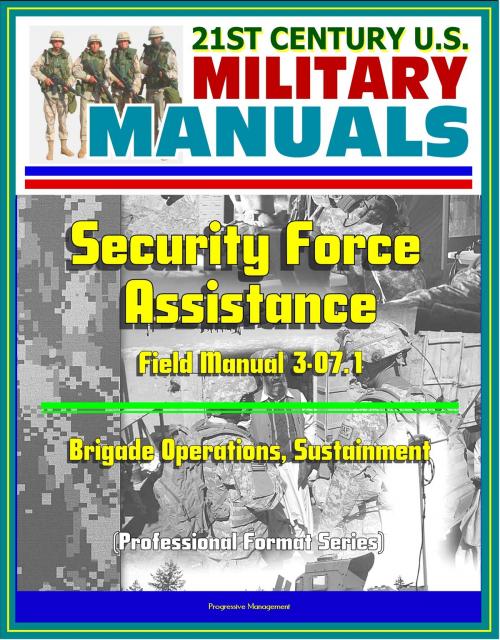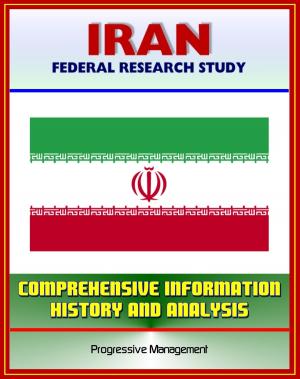21st Century U.S. Military Manuals: Security Force Assistance - Field Manual 3-07.1 - Brigade Operations, Sustainment (Professional Format Series)
Nonfiction, History, Military, United States| Author: | Progressive Management | ISBN: | 9781301943760 |
| Publisher: | Progressive Management | Publication: | November 24, 2012 |
| Imprint: | Smashwords Edition | Language: | English |
| Author: | Progressive Management |
| ISBN: | 9781301943760 |
| Publisher: | Progressive Management |
| Publication: | November 24, 2012 |
| Imprint: | Smashwords Edition |
| Language: | English |
Professionally converted for accurate flowing-text e-book format reproduction, this Army Field Manual addresses common characteristics and considerations for conducting security force assistance and clarifies what units and individual advisors must understand to work "by, with, and through" their counterparts. Since every situation and foreign security force is unique, units and individuals conducting security force assistance must carefully analyze the operational environment, especially the relationships of foreign security forces and their population. Conducting successful security force assistance requires adaptive units led by well-informed, culturally astute leaders. FM 3-07.1 provides commanders, staffs, and advisors with the common doctrine for achieving this goal.
Chapter 1 * THE STRATEGIC CONTEXT * Security Force Assistance and the Strategic Context * National Strategy and Defense Policies * Related Operations and Programs * Chapter 2 * FRAMEWORK * Mindset * Imperatives * Tasks * Activities * Types * Chapter 3 * BRIGADE OPERATIONS PROCESS * Battle Command * Operations Process * Chapter 4 * THE MODULAR BRIGADE AUGMENTED FOR SECURITY FORCE ASSISTANCE * The Brigade Combat Team * Brigade Combat Team Phases * Subordinate Units * Sample Troop-to-Task Model * Chapter 5 * UNIT OPERATIONS * Premission * Deployment * In-Country Preparation * Employment * Redeployment * Postdeployment * Chapter 6 * SUSTAINMENT * Sustainment in Foreign Security Forces Capacity * Asset Management and Performance * Operational Contract Support * External Agencies Support Management * Facilitating the Redeployment Process * Chapter 7 * THE ADVISOR * Roles of the Advisor * Considerations of the Advisor * Personality Traits of the Advisor * Skills of the Advisor * Chapter 8 * CULTURE AND COMMUNICATION * Society * Culture * Cross-Cultural Communications * Chapter 9 * WORKING WITH COUNTERPARTS * Establishment of Rapport * Accomplishment of Rapport * Policies and Agreements * Levels of Advisors * Considerations of Rapport * Recommended Practices in Building Rapport * Dynamics of Advising Foreign Security Forces * Chapter 10 * CROSS-CULTURAL INFLUENCING AND NEGOTIATING * Influencing * Cross-Cultural Negotiating * Appendix A * ARMY SPECIAL OPERATIONS FORCES IMPERATIVES * Appendix B * LEGAL CONSIDERATIONS * Appendix C * INFORMATION ENGAGEMENT
Professionally converted for accurate flowing-text e-book format reproduction, this Army Field Manual addresses common characteristics and considerations for conducting security force assistance and clarifies what units and individual advisors must understand to work "by, with, and through" their counterparts. Since every situation and foreign security force is unique, units and individuals conducting security force assistance must carefully analyze the operational environment, especially the relationships of foreign security forces and their population. Conducting successful security force assistance requires adaptive units led by well-informed, culturally astute leaders. FM 3-07.1 provides commanders, staffs, and advisors with the common doctrine for achieving this goal.
Chapter 1 * THE STRATEGIC CONTEXT * Security Force Assistance and the Strategic Context * National Strategy and Defense Policies * Related Operations and Programs * Chapter 2 * FRAMEWORK * Mindset * Imperatives * Tasks * Activities * Types * Chapter 3 * BRIGADE OPERATIONS PROCESS * Battle Command * Operations Process * Chapter 4 * THE MODULAR BRIGADE AUGMENTED FOR SECURITY FORCE ASSISTANCE * The Brigade Combat Team * Brigade Combat Team Phases * Subordinate Units * Sample Troop-to-Task Model * Chapter 5 * UNIT OPERATIONS * Premission * Deployment * In-Country Preparation * Employment * Redeployment * Postdeployment * Chapter 6 * SUSTAINMENT * Sustainment in Foreign Security Forces Capacity * Asset Management and Performance * Operational Contract Support * External Agencies Support Management * Facilitating the Redeployment Process * Chapter 7 * THE ADVISOR * Roles of the Advisor * Considerations of the Advisor * Personality Traits of the Advisor * Skills of the Advisor * Chapter 8 * CULTURE AND COMMUNICATION * Society * Culture * Cross-Cultural Communications * Chapter 9 * WORKING WITH COUNTERPARTS * Establishment of Rapport * Accomplishment of Rapport * Policies and Agreements * Levels of Advisors * Considerations of Rapport * Recommended Practices in Building Rapport * Dynamics of Advising Foreign Security Forces * Chapter 10 * CROSS-CULTURAL INFLUENCING AND NEGOTIATING * Influencing * Cross-Cultural Negotiating * Appendix A * ARMY SPECIAL OPERATIONS FORCES IMPERATIVES * Appendix B * LEGAL CONSIDERATIONS * Appendix C * INFORMATION ENGAGEMENT















